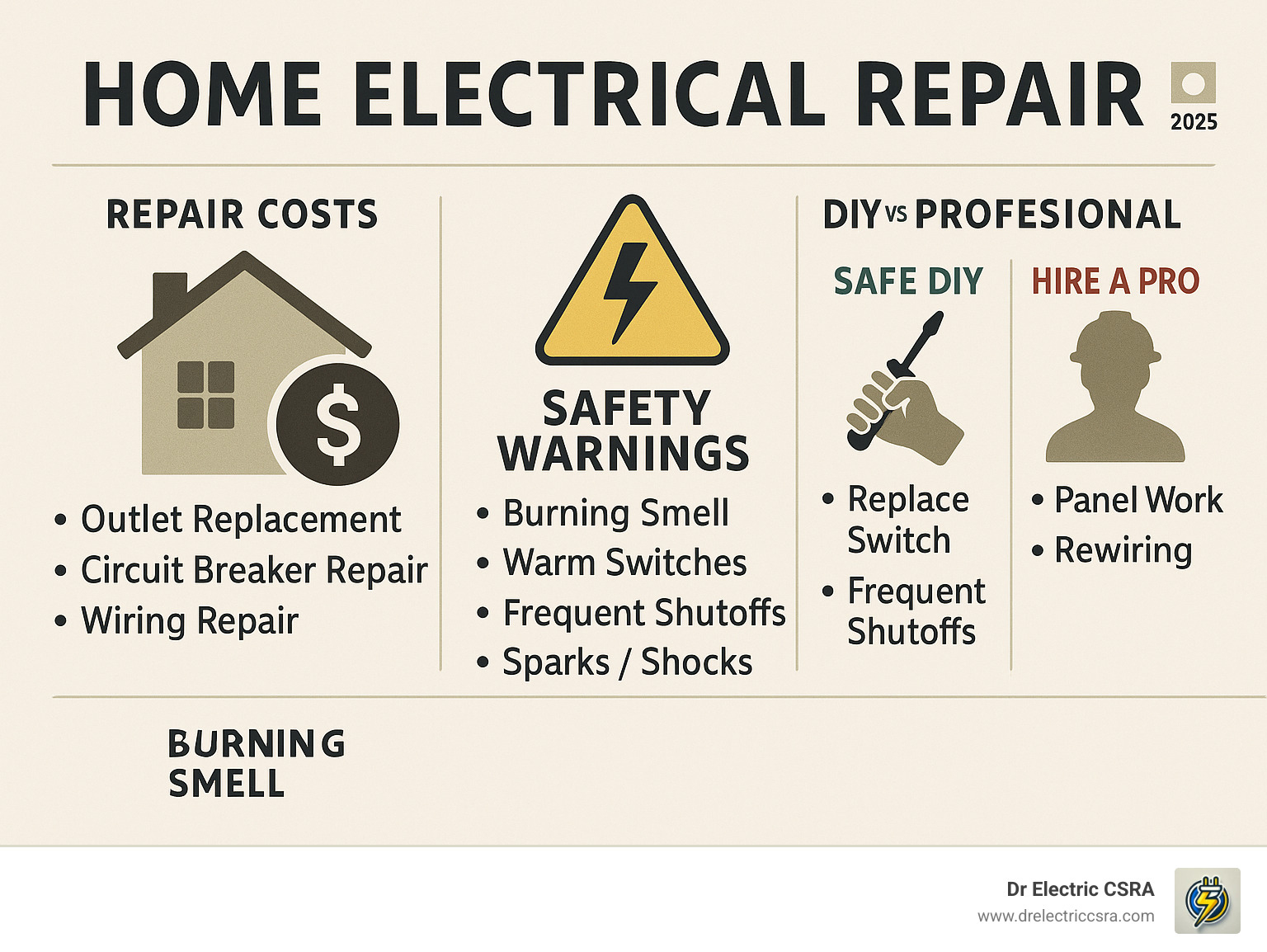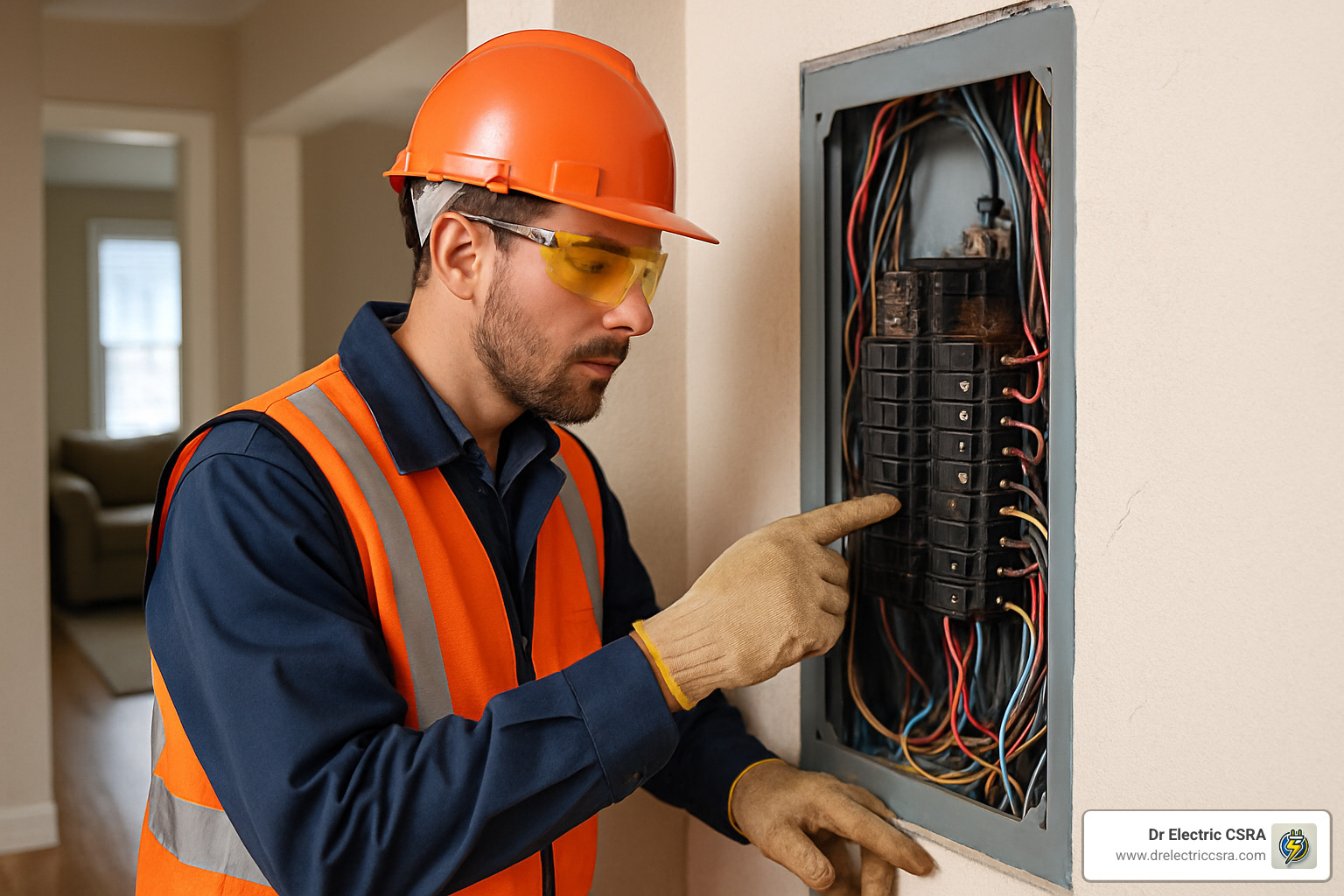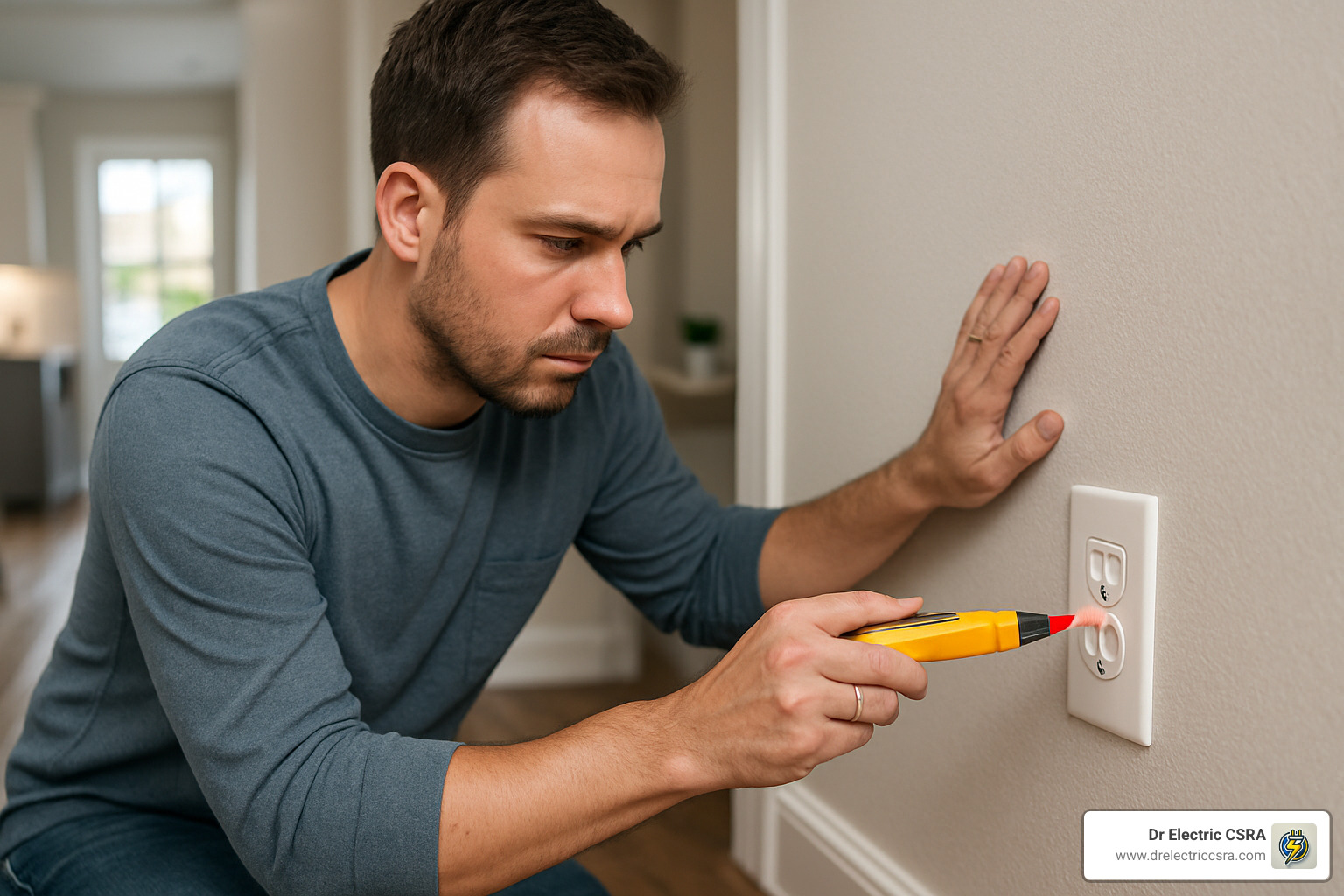Why Home Electrical Issues Can’t Wait
Home electrical repair is a critical service that keeps your family safe and your property protected from dangerous electrical hazards. When electrical problems strike, quick action can prevent house fires, electrocution, and costly damage to your home’s systems.
Most Common Home Electrical Repairs:
- Outlet replacements – loose connections, GFCI failures, worn contacts
- Circuit breaker repairs – frequent tripping, overloaded circuits
- Panel upgrades – outdated 100-amp service, code compliance issues
- Wiring repairs – frayed wires, backstabbed outlets, aluminum wiring
- Light fixture problems – flickering lights, buzzing sounds, switch failures
When to Call a Professional:
- Burning smells or scorch marks around outlets
- Frequent circuit breaker trips
- Warm switches or outlets
- Sparks when plugging in appliances
- Electrical shocks from switches
DIY vs. Professional Work:
- Safe DIY tasks: Replace switches, reset breakers, fix extension cords
- Always hire a pro: Panel work, new circuits, whole-house rewiring
With approximately 51,000 electrical fires occurring yearly in the U.S., many of which could be prevented with proper maintenance and timely repairs, addressing electrical issues quickly isn’t just about convenience – it’s about safety.
I’m Jesse Burnett, a Master Electrician and founder of Dr. Electric CSRA, with over 1,200 completed residential, commercial, and industrial jobs throughout my career. My experience with home electrical repair spans everything from simple outlet replacements to complex panel upgrades.

Simple home electrical repair word guide:
Why This Guide Matters
Fire risk is real – we’ve responded to countless emergency calls where a simple electrical issue could have been prevented with proper maintenance. When you understand the warning signs and know when to call for help, you’re protecting your family and ensuring peace of mind.
Understanding Your Home’s Electrical System & Its Trouble Spots
Your home’s electrical system works like the circulatory system of your house. Electricity flows from your electrical panel through circuits to power every outlet, switch, and light fixture in your home.
Your electrical panel acts as mission control, distributing power safely throughout your property. When something goes wrong in this system, it can create dangerous situations that need immediate attention.
Homes built in the ’80s and ’90s often have “backstabbed” outlets where wires are pushed into holes instead of being properly secured with screws. Over time, these connections loosen up, causing flickering lights and intermittent power loss.
When outlets start getting loose, they create heat. That burning smell you might notice is often the first sign that something’s not right. The plastic around the outlet starts to get warm, and if left unchecked, it can lead to a fire.
Circuit breakers are your home’s safety guards. They’re designed to trip when they detect trouble – whether that’s an overload, a short circuit, or a ground fault. When breakers trip frequently, they’re trying to tell you something.
According to the latest research on electrical fires, approximately 51,000 electrical fires occur yearly in the U.S. Many of these could be prevented with proper maintenance and timely repairs.
Most Common Problems That Lead to Home Electrical Repair
Loose outlets are probably the most common issue we see. When you plug something in and it falls right back out, or you have to wiggle the plug to get it to work, the contact points inside the outlet have worn out. This creates dangerous arcing that generates heat.
Outdated wiring is another major concern. Homes built before 1950 might have knob-and-tube wiring, which lacks modern safety features. Homes built between 1965 and 1973 sometimes have aluminum wiring, which expands and contracts with temperature changes, gradually loosening connections.
Overloaded circuits are increasingly common as we add more devices to our homes. Signs include lights dimming when you turn on appliances, warm outlet covers, and breakers that trip regularly.
GFCI failures are particularly serious because these outlets are your first line of defense against electrocution. When they stop working properly, you lose that protection.
Warning Signs You Need Help ASAP

Scorch marks around outlets or switches are emergency situations that need immediate professional attention. The arcing that creates these marks generates enough heat to ignite surrounding materials.
Buzzing sounds from electrical components are never normal. Electricity should flow silently through your system. Buzzing usually means connections are loose and arcing is occurring.
Warm switches or outlets are clear red flags. Under normal operation, electrical components should never feel warm to the touch.
Frequent circuit breaker trips mean your electrical system is working overtime to protect you. While an occasional trip is normal, frequent tripping indicates dangerous conditions that need professional diagnosis.
Home Electrical Repair—DIY vs. Calling a Licensed Electrician

The decision between DIY electrical work and hiring a professional comes down to safety, complexity, and local code requirements. While some basic electrical tasks can be safely performed by homeowners, many repairs require the expertise of a licensed electrician.
Professional electricians have specialized training, tools, and experience that enable them to safely diagnose and repair electrical problems. DIY electrical work can be dangerous if you lack proper knowledge and tools. Electrical shock, electrocution, and fire are real risks when working with electricity.
| Aspect | DIY | Professional |
|---|---|---|
| Cost | Lower upfront cost | Higher upfront cost, but includes warranty |
| Time | Can take longer without experience | Efficient completion |
| Safety | Risk of injury or fire | Trained safety protocols |
| Code Compliance | May not meet current codes | Guaranteed code compliance |
| Warranty | No warranty on work | Work and parts warranty |
Safety Precautions Before Any Home Electrical Repair
Before attempting any electrical work, you must turn off the circuit breaker that supplies power to the area you’re working on. After switching off the breaker, tape it in the “off” position to prevent accidental restoration of power.
Use a non-contact voltage tester to verify that power is actually off before touching any wires or electrical components. Never assume power is off just because you flipped a breaker.
More info about Electrical Grounding for Safety explains the importance of proper grounding in electrical systems. Grounding provides a safe path for electrical current in case of faults, protecting you from shock and reducing fire risk.
Personal protective equipment (PPE) is essential for electrical work. This includes safety glasses, insulated gloves, and non-conductive footwear.
Basic Repairs Most Homeowners Can Do Themselves
Replacing a light switch is one of the safest DIY electrical tasks. After turning off power and verifying it’s off with a voltage tester, you can remove the old switch and install a new one by connecting wires to the same terminals.
Swapping an outlet requires attention to proper wire connections. Match the existing wire connections – typically black (hot) to brass terminals, white (neutral) to silver terminals, and green or bare copper (ground) to the green terminal.
Resetting a tripped breaker involves finding the breaker in the middle position, pushing it firmly to “off,” then back to “on.” If the breaker trips again immediately, you have a serious problem that requires professional attention.
Repairs That Always Require a Pro
Panel upgrades and repairs should always be performed by licensed electricians. Working inside electrical panels exposes you to potentially lethal voltages, and mistakes can cause fires or electrocution.
Whole-home rewiring is a major project that requires permits, inspections, and extensive knowledge of electrical codes. Installing dedicated circuits for appliances like electric ranges or EV chargers requires professional expertise.
Any electrical work requiring permits must be performed by licensed professionals. Permits ensure that work meets current electrical codes and includes proper inspections.
Choosing & Hiring the Right Electrician Near You
Finding the right electrician for your home electrical repair needs is crucial for your family’s safety. Here in Augusta, Evans, Grovetown, Martinez, and throughout the CSRA region, not all electricians are created equal.
Licensed and insured aren’t just fancy words on a business card. A licensed electrician has completed required training and passed examinations proving they know electrical codes and safety practices. Insurance protects you from liability if something goes wrong during the work. Always verify that any electrician you hire carries both liability insurance and workers’ compensation coverage.
Background checks and customer reviews tell you what you need to know about an electrician’s work quality and reliability. Look for electricians with consistent positive reviews and a solid track record.
Flat-rate pricing helps you know the cost upfront, allowing you to make informed decisions about repairs and upgrades without worrying about escalating hourly rates.
When electrical emergencies strike, you need 24/7 emergency service. Electrical problems like sparking outlets, burning smells, or sudden power outages can’t wait until Monday morning. More info about Emergency Electrician Services explains how we respond to electrical emergencies throughout the CSRA region.
The Hiring Process Step-by-Step
Start your online search by looking for local electricians with good reviews and proper licensing. Check your state’s licensing board website to verify that electricians are currently licensed and haven’t had disciplinary actions.
Read reviews on multiple platforms including Google and Better Business Bureau. Look for patterns in reviews rather than focusing on individual complaints. Pay attention to how companies respond to negative reviews.
Get at least three quotes for any significant electrical work. This helps you understand fair pricing and gives you options to compare. Be wary of quotes that are significantly higher or lower than others.
Always require written contracts that specify the scope of work, materials to be used, timeline for completion, and total cost. Never agree to work without a written contract.
Questions to Ask Before Signing
Ask about the electrician’s experience with your specific type of problem. Someone who regularly performs panel upgrades will complete your project more efficiently and safely.
Inquire about warranties on both labor and materials. Professional electricians typically offer warranties on their work, showing confidence in their craftsmanship.
Discuss the timeline for completion and any factors that might cause delays. Ask about cleanup responsibilities and site protection.
Verify that the electrician will obtain necessary permits and schedule required inspections. Permits ensure that work meets current codes and includes proper inspections.
Costs, Insurance & Future-Proof Upgrades
Understanding home electrical repair costs upfront helps you make smart decisions about your family’s safety and your budget. At Dr. Electric CSRA, we use flat-rate pricing so you know what to expect.
Service call fees typically run between $99 and $129, depending on when you need us. We often waive this fee when you proceed with our recommended repairs.
Outlet replacement typically costs between $150 and $200 per outlet, including both labor and materials. GFCI outlets run slightly higher due to their specialized safety features, but they’re required by code in bathrooms, kitchens, and outdoor areas.
Ceiling fan installation varies from $50 to $200 depending on what’s involved. If you’re replacing an existing light fixture, it’s usually on the lower end. New wiring or ceiling support increases the cost.
Panel upgrade costs vary significantly based on your home’s specific needs. Upgrading from 100-amp to 200-amp service typically runs several thousand dollars, but it’s often necessary for modern homes with air conditioning, computers, electric vehicles, and smart home devices.
Insurance impact is important to consider. Insurance companies want to see documentation that electrical work was done by licensed professionals. DIY electrical work or hiring unlicensed workers can actually void your coverage.
Warranties give you peace of mind long after we’ve finished the job. We stand behind our work with solid labor warranties, and all electrical components come with manufacturer warranties.
The smart home trend is exploding, with 65% of Americans owning at least one smart device. When doing electrical upgrades, it’s the perfect time to plan for smart switches, outlets, and home automation systems.
Whole-house surge protection is becoming essential as our homes fill with expensive electronics. Lightning strikes and power grid fluctuations can destroy thousands of dollars worth of equipment in seconds.
More info about Upgrade Electrical services shows how modern electrical systems can improve your home’s safety, efficiency, and value.
Signs It’s Time for a Panel or Wiring Upgrade
Frequent circuit breaker trips are your electrical system’s way of crying for help. When breakers trip regularly, it means your electrical demand is exceeding what your system can safely handle.
100-amp electrical service was plenty in the past, but today’s homes really need 200-amp service to operate safely with central air conditioning, electric heating, multiple computers, and other modern appliances.
Renovation plans often trigger the need for electrical upgrades. Adding a new bathroom, updating your kitchen, or finishing a basement usually means adding circuits.
EV charger installation is becoming popular, and these units need dedicated 240-volt circuits that draw significant power. Your electrical system needs to be ready to handle that extra load safely.
Maintenance Tips to Prevent Future Repairs
Annual electrical inspections by qualified professionals can catch problems before they become expensive emergencies. During these inspections, we check connections, test safety devices, and identify potential hazards.
Test GFCI outlets monthly by pressing the “test” button and making sure the power shuts off, then hit “reset” to restore power. If your GFCI outlets don’t respond properly to testing, they need replacement.
Keep electrical panels clean and free of debris. Make sure there’s at least 3 feet of clear space in front of your panel and 30 inches of width clearance.
Balance electrical loads across circuits to prevent overloading. Avoid plugging multiple high-power devices into the same circuit.
Frequently Asked Questions About Home Electrical Repair
When it comes to home electrical repair, homeowners naturally have questions about costs, safety, and what to expect. Let me address the most common questions we receive.
What is the average cost of home electrical repair?
Home electrical repair costs depend on what’s actually wrong with your system. When we come out for a diagnostic visit, there’s typically a service fee between $99 and $129 – but most companies waive that fee if you decide to move forward with the recommended repairs.
For everyday repairs, outlet replacement runs about $150 to $200 per outlet. Simple switch replacements fall into a similar range. For bigger projects like panel upgrades, you’re looking at several thousand dollars.
Parts costs are pretty standard across the industry, but labor varies based on how complex the job is. Emergency calls cost more than scheduled work. Getting quotes from multiple electricians helps ensure you’re getting fair pricing.
How do I know if my electrical system is up to code?
Your electrical system might have been perfectly legal when your house was built, but codes change every few years. What was acceptable in 1995 might not meet today’s safety standards.
The best way to know for sure is to have a professional electrical inspection. We look for things like missing GFCI protection in bathrooms and kitchens, outdated wiring methods, and grounding issues.
When you hire a licensed electrician for any significant work, they should handle permits and make sure everything meets current National Electrical Code (NEC) standards. Permits ensure inspections happen, which means someone besides the electrician is checking that the work was done right.
Do electrical repairs affect my home insurance?
When you hire a licensed electrician and get proper permits, electrical repairs typically help your insurance situation rather than hurt it. Insurance companies love seeing that your electrical system is safe and up to code.
Some upgrades, like installing whole-house surge protection or upgrading an old electrical panel, might even qualify you for insurance discounts.
DIY electrical work or hiring someone who isn’t licensed can actually void your insurance coverage. If improper electrical work causes a fire or someone gets hurt, your insurance company might refuse to pay the claim.
Keep all your electrical work documentation – permits, inspection certificates, warranties, and receipts. This paperwork proves that work was done properly and can be crucial if you ever need to file an insurance claim.
Conclusion
Your home’s electrical system deserves attention as a critical part of your property. When you consider that approximately 51,000 electrical fires happen across the United States every year, it becomes clear that home electrical repair isn’t just about keeping the lights on – it’s about keeping your family safe.
Think of your electrical system as the nervous system of your home. Just like you wouldn’t ignore chest pains, you shouldn’t ignore flickering lights, warm outlets, or that subtle burning smell. These warning signs are your home’s way of asking for help.
Throughout this guide, we’ve covered everything from spotting trouble early to understanding when a simple outlet swap becomes a “call the pros immediately” situation. The bottom line is simple: electricity doesn’t forgive mistakes. While changing a light switch might seem straightforward, even basic electrical work can turn dangerous if you encounter unexpected wiring or skip safety steps.
At Dr. Electric CSRA, we serve Augusta, Evans, Grovetown, Martinez, and throughout the CSRA region because we believe every home deserves safe, reliable electrical service.
Here’s what I want you to remember: electrical problems rarely fix themselves, and they almost always get worse over time. That outlet that’s been loose for months is creating heat and wearing down connections. Those breakers that trip “just occasionally” are protecting your home from something that needs professional attention.
Whether you’re dealing with an emergency like sparking outlets or planning upgrades like EV charger installation, the investment in professional electrical service pays dividends in safety, reliability, and peace of mind. Your family’s safety and your home’s value are worth doing electrical work right the first time.
Ready to address those electrical concerns you’ve been putting off? Contact Dr. Electric CSRA today. Our licensed electricians are available 24/7 for emergencies, and we’re always ready to help with routine maintenance and upgrades. More info about Electrical Repair services and how we can help keep your home safely powered up.
Remember: when it comes to home electrical repair, the best time to call a professional is before you need one urgently. Schedule your electrical inspection today – your future self will thank you.






0 Comments